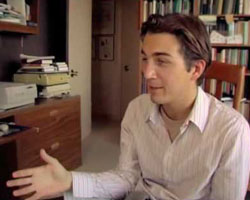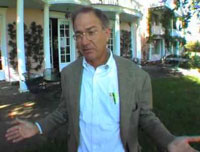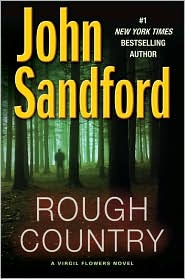 “Rough Country” (2009) is the third book starring Virgil Flowers, a series John Sandford started in 2008. Sandford is best known for the Lucas Davenport “Prey” series (each title includes the word “prey”). He started that series in 1989, and has now pumped out 21 “Prey” books. But the Virgil Flowers books are better. Or, at least, Flowers is a much more interesting character than Davenport (for whom Flowers works, out of Minneapolis).
“Rough Country” (2009) is the third book starring Virgil Flowers, a series John Sandford started in 2008. Sandford is best known for the Lucas Davenport “Prey” series (each title includes the word “prey”). He started that series in 1989, and has now pumped out 21 “Prey” books. But the Virgil Flowers books are better. Or, at least, Flowers is a much more interesting character than Davenport (for whom Flowers works, out of Minneapolis).
I read the first two Virgil Flowers books back-to-back in January 2010, and followed them with two of the Prey books. I reviewed all four together. Plenty of the Flowers free-spirit personality comes out in “Rough Country,” all wrapped in a package which includes shoulder-length blonde hair, a T-shirt from a rock groups, a blazer, and cowboy boots. Before going to sleep, Flowers usually thinks about God.
“Rough Country” finds him fishing in a remote area outside of the Twin Cities. At a lake resort called the Eagle’s Nest, a place which attracts lesbians who want to get away, a businesswoman is murdered while canoeing. Virgil, being nearby, is asked to investigate. The plot includes a promising singer named Wendy and her all-girl band, her father, a very strange brother called the Deuce, some interested local policemen, the hotel’s owner and its prospective buyer, and a continually frustrated love entanglement.
I don’t like books where key clues aren’t divulged until the end, when the protagonist unspins how the murder happened to astonished listeners (one of whom is usually the bad guy). Some of the older writers, like Chandler and Hammett, tended to do that, and you see it a lot in movies. I don’t think that’s playing fair. The reader should have access to all of the clues that the protagonist has access to, and at the same time. We should be privy to the protagonist’s thoughts as he’s putting things together, not kept in the dark until he lays it all out.
In “Rough Country,” when the murderer was finally revealed and Flowers explains to others how he cracked the case, I realized that Sandford had dropped all of those clues along the way. Everything was there, practically staring me in the face, but I hadn’t been smart enough to put it together. That is playing fair, and playing very cleverly–telling me what happened, but without me realizing it.
As in the other two books, Lucas Davenport makes recurring appearances, usually by phone as Virgil Flowers keeps him posted about how the investigation is going.
While I enjoyed “Rough Country,” I liked the first two books, “Dark of the Moon” and “Heat Lightning,” even better. A fourth Flowers book came out in hardback in September 2010, so I can expect the paperback sometime this summer.
Sandford’s real name is John Camp. He didn’t start writing novels until age 45. Before that, he was a Pulitzer Prize winning reporter, a job he left after hitting it big as a novel writer. His first book was “Fool’s Run,” the first Kidd book. But then he wrote “Rules of Prey,” which Putnam put on a fast-track because it was so good. The result: the two books were coming out within months of each other. To avoid confusion, Putnam asked him to come up with a pseudonym. He chose his father’s middle name, Sandford.


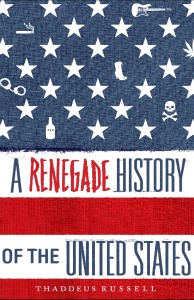 I previously reviewed the book “A Renegade History of the United States,” by Thaddeus Russell, who teaches history and American studies at Occidental College. It gives an alternative, sometimes politically-incorrect, view of our history.
I previously reviewed the book “A Renegade History of the United States,” by Thaddeus Russell, who teaches history and American studies at Occidental College. It gives an alternative, sometimes politically-incorrect, view of our history. I agree with what Donald Trump wrote:
I agree with what Donald Trump wrote: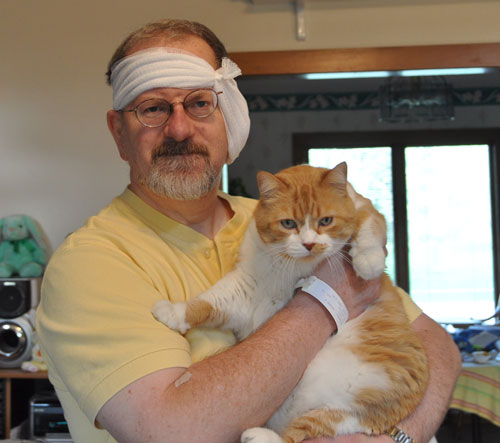
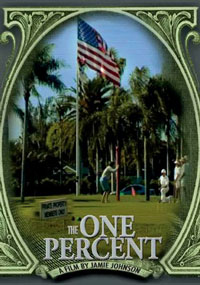 “The One Percent” is about the richest of the rich in America, the 1% of people who control over half of the country’s wealth, and who keep getting richer and richer, helped along by friendly legislators and tax codes. It’s about the gap that exists between everyday Americans and the ultra-rich.
“The One Percent” is about the richest of the rich in America, the 1% of people who control over half of the country’s wealth, and who keep getting richer and richer, helped along by friendly legislators and tax codes. It’s about the gap that exists between everyday Americans and the ultra-rich.